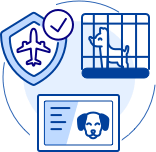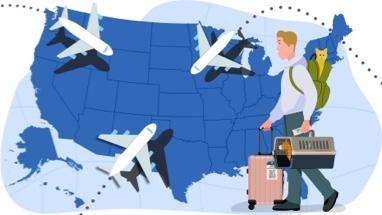Pet travel from the United States to Belize
Welcome! This page will guide you through the rules and requirements for traveling internationally with your pet.
Before You Start the Process
Find a USDA-Accredited Veterinarian
With help from a USDA-accredited veterinarian, you can learn more about your destination country's entry requirements for pets, including any needed vaccinations, tests, or treatments. We recommend creating a schedule to make sure you meet all requirements within the specified timeframe.
Gather This Information for Your USDA-Accredited Veterinarian
- The type of pet traveling
- The destination country
- If applicable, countries where your pet will stop (for customs clearance or upon leaving the airport or seaport) on the way to the destination country
- The date of departure from the United States
- Whether the pet will be traveling alone, as cargo, or with a person in the cabin of the plane
- Note: If you're traveling with a pet bird or exotic animal, you may need to work with additional agencies, such as the U.S. Fish and Wildlife Service (1.41 MB) and Centers for Disease Control and Prevention.
Read These Resources
- Pet Travel Guidance for Pets Traveling to Another Country From the United States
- In Spanish (En Español): Guía de viaje para mascotas que viajan a otro país desde Estados Unidos
- In Chinese (用中文(表達): 宠物出国旅行指南
- Frequently Asked Questions About Traveling With Your Pet
Travel Requirements Based on Pet Type
Note: Certificates for pet dogs and cats to Belize do not require APHIS endorsement.
All cats and dogs exported from the United States to Belize require an import permit. In order to obtain the latest import requirements and download permit application please visit the Belize Agricultural Health Authority website.
Belize contact information:
Tel: 011-501-824-4872/99
Fax: 011-501-824-4889
E-mail: animalhealthbz@gmail.com
Pets are to be accompanied by a veterinary health certificate (333.88 KB) issued by a USDA accredited veterinarian. USDA endorsement of the health certificate is not required.
- It is strongly recommended that:
- All dogs be vaccinated against Distemper, Hepatitis, Leptospirosis, and Parvovirus.
- All cats be vaccinated against Feline Viral Rhinotracheitis, Calici Virus, and, Panleucopaenia.
- Pets be treated against endoparasites and ectoparasites within thirty (30) days of exportation.
- Pets less than four (4) months of age: rabies vaccination is waived as an import requirement but pets will be held in home quarantine in Belize until thirty (30) days after rabies vaccination can be administered by a registered veterinarian.
- Importer must notify date, time and flight number to BAHA two days before pets arrive to ensure that a veterinary officer is present at the time of entry. All pet animals entering Belize are to be inspected by a BAHA official.
- The transport cage is to be new or cleaned and disinfected prior to use for the exportation of the pet.
Note: Certificates for pet birds to Belize require endorsement (review/countersigning) by USDA APHIS after issuance (signing) by the USDA Accredited Veterinarian. This country allows USDA Accredited Veterinarians to use USDA’s online Veterinary Export Health Certification System VEHCS to complete health certificates. VEHCS may need the USDA Accredited Veterinarian to upload the completed fillable PDF version found below. Either save a copy of the PDF below, or return to this page for the health certificate, if prompted by VEHCS USDA Accredited Veterinarians, log in here if you wish to use VEHCS.
- The Director of Animal Health is to be notified seven (7) days in advance of date and time of arrival of pet birds at point of entry. Veterinary examination of birds at point of entry will be done in addition to regular inspection. For your information, the telephone numbers of veterinarians to contact are:
- Dr. Victor Gongora – Central Farm - Ph: 824 – 4899/4972 (Director of Animal Health)
- Dr. Joe Myers - Orange Walk - Ph: 322-3257 (Santa Elena Northern Border)
- Dr. Miguel DePaz - Cayo - Ph: 824-4899/4872 (Benque Viejo Western Border, and Big Creek)
- Dr. Miguel Figueroa -Belize District - Ph:224-4794/5230 (International Airport)
- Prior to the issue of an import permit for the importation of pet birds:
- An import risk analysis must be done and recommendations from the risk analysis must be favorable.
- The Veterinary Officer in the district where pet birds will be quarantined must certify that the quarantine station meets biosecurity standards and has spoken to importer re: quarantine arrangements and costs.
- An import license from the Forest Department must be obtained. This import license will outline the requirements your pet bird must meet to travel to Belize.
- The pet birds and accompanying documents are to be presented to the Veterinary Officer at the point of entry. Pet birds not permitted entry will be returned to origin or confiscated at the expense of the importer.
- The pet birds are to be inspected at the port of entry into Belize and are not to show any signs of fresh wounds, wounds in the process of healing, tumors, ectoparasites and signs of infectious or contagious disease.
- Any cost incurred in the processing of pet birds for entry into Belize will be borne by the importer.
- Pet birds allowed entry into Belize will be subjected to a period of quarantine not less than thirty (30) days. During quarantine the pet birds may be retested and must be negative to any test done before being released from quarantine. These costs as well as cost of supervision during quarantine period, including cost of any health measure taken during the period, are to be borne by the importer.
- The vehicles used to transport the pet birds from the port of entry into Belize to the quarantine station were cleaned and disinfected.
- No feed or bedding accompanying the pet birds will be allowed entry.
- Pet birds are to be accompanied by an official international veterinary certificate and addendum. The health certificate must be endorsed by the USDA.
- Health Certificate for Pet Birds (155.3 KB) (155.3 KB)
For pet travel requirements not listed, APHIS has not been officially informed by the foreign country about the requirements for your pet’s travel. We recommend that you contact a government official of the country you are traveling to for more information.
Country of Destination Contact Information
Countries Participating in the European Union
Austria
Belgium
Bulgaria
Croatia
Cyprus
Czech Republic
Denmark
Estonia
Finland
France
Germany
Greece
Hungary
Republic of Ireland
Italy
Latvia
Lithuania
Luxembourg
Malta
Netherlands
Northern Ireland*
Norway**
Poland
Portugal
Romania
Slovakia
Slovenia
Spain
Sweden
Switzerland**
* Northern Ireland is part of the United Kingdom (UK), but will continue to follow European Union (EU) requirements even though the UK is no longer part of the EU.
** Norway and Switzerland are not part of the EU but have adopted EU legislation for import of most species of live animals.
Important Travel Considerations
If you are transiting (passing through) the European Union:

If your pet is traveling through (transiting) a country in the European Union (EU) on the way to a third, non-EU country, you will also need a transit health certificate for your pet for the EU. The transit health certificate will be the same as if your pet’s final destination was the EU country. Use the information and steps above under “Travel Requirements Based on Pet Type” to determine which health certificate should be used. View a list of EU countries.
Considerations for airline travel:

Airlines and shipping lines have their own policies and requirements for transporting pets. Check with your airline or shipping representative to determine what requirements they may have.
Will you be returning to the United States with your pet?

View the Requirements
ALERT: Read the CDC Notice of Temporary Suspension of Dogs Entering the United States From Countries Classified as High Risk for Dog Rabies.

